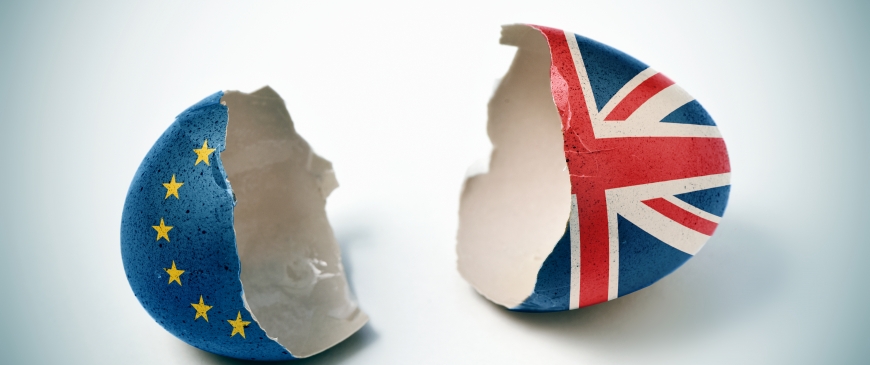
How Brexit burst the Brussels bubble
For the past three months, a casual observer in Brussels could have been forgiven for thinking that Brexit was just the name of a new craft beer, brewed somewhere in Flanders. Some EU experts (and there are many, many EU experts in Brussels) dismissed the idea of a British departure from the EU. They laughed it off, as the latest eccentricity of those odd neighbours from the other side of the Channel, like sausages for breakfast and beer served at room temperature. They adopted a time-honoured strategy in Brussels: holding on tight until the storm had passed.
Others saw the British as an obstacle to the European project, and rejoiced at the idea of getting rid of that annoying relative, always pleading for special treatment, always securing one more concession, sometimes even getting their money back. This group actively shouted its support for Brexit. In some corners of the city, one heard voices asking why the EU should even try to keep in a member who did not abide by the rules. The February deal obtained by British Prime Minister David Cameron in February was the nail in the coffin: the EU, they said, had bent over backwards to please the UK, and in doing so had betrayed some of the founding principles of the European project. The European dream, they went on, would be better off without the UK on board.
Except that there is no European dream any longer. As Charles Grant has said, there is little appetite in EU capitals to pursue the project of the European super-state Jean Monnet and others wanted. Haunted by populism and anti-European sentiment all across the continent, the EU is no longer on course to becoming the political union foreseen by the Maastricht Treaty in 1992. And Brussels should wake up to that reality.
Brexit is not the fault of the European Union. The EU referendum in the UK was as much about populism and nationalism as it was about legitimate frustration at the EU. Regretfully, both camps chose to focus on migration and sovereignty instead of debating what is wrong with Europe and how to fix it. The principle of free movement has contributed to the anger over migration, but immigrants and refugees come from outside the EU as well, and the UK did not join the Schengen area, which abolished internal borders. Brussels is not responsible for what happened on Friday, but it has unintentionally helped.
The Brussels ‘bubble’ went into this campaign with an astonishing lack of understanding of British politics. Worse still, it went into it with the confidence of those who think they know better (perhaps because they made the false assumption that David Cameron did know better). As so many times before, they failed to read the signs. There was no Plan B. They did not see this one coming.
It is time for Brussels to realise that ‘business as usual’ is no longer an option; that citizens across the continent are disenchanted, and that they are right to be; that countries cannot simply be dismissed as ‘eurosceptic’, or ‘problematic’, when their internal politics turn nasty. In the wake of the British referendum, there has to be some collective soul-searching in the corridors of the European Commission, the European Parliament, the Council of Ministers and the European Court of Justice.
Brexit is the third major crisis in the past two years. In the past, the EU dealt with institutional problems through political compromises. One example often raised is that of the ‘empty chair crisis’: in 1965, France threatened to veto further integration of the then European Communities, by withdrawing the French representative from negotiations on how the Community should be designed. This is regarded as one of the defining moments for Europe. The problem was eventually solved by adopting a complicated mechanism ensuring that compromises could be reached (the Luxembourg compromise). Some in Brussels believe that, over the years, the EU has shown resilience in overcoming such crises, and that this latest string is no different. But it is fundamentally different. It is no longer enough for officials in the EU institutions to pretend that Brexit, the refugee and eurozone crises are like anything the EU has overcome in the past. Few of those who voted ‘Leave’ on Thursday (and few of those belonging to populist or extremist parties around Europe) had ever heard about the abstract rows behind the empty chair crisis. But all of them have heard about the struggles of Greece, Italy and Spain; of the one million refugees marching across the EU; of the three terrorist attacks and the many threats facing the continent. These are the things that really matter to the 500 million European citizens the EU institutions are supposed to be taking care of.
Europeans are scared, they are wary of migration, many have lost their jobs. Brussels cannot counter-attack with yet another round of good-for-nothing summits, and empty political declarations. What Brussels needs now, above all, is outsiders. Strong, clear-minded leaders and thinkers, with a vision for the continent who were not born and bred within the European bubble. It also needs to explain and defend the European project, not with regulations and acronyms, but with a sober and realistic case for the EU – ironically, just the kind of case which David Cameron used in his effort to ward off Brexit, but far too late to be useful. The EU needs to start listening to its citizens, eurosceptic though they may be, if it wants to save what is left of the European project.
Camino Mortera-Martinez is a research fellow at the Centre for European Reform.
